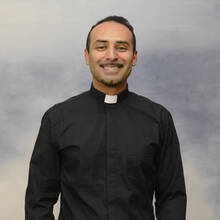Repenting from Shallowness of Spirit
This Sunday’s readings continue last Sunday’s theme of “call and response,” but they introduce a new element to it. God’s mercy is so vast that those who respond to God’s call must expand their minds to understand it. This is the classical meaning of “repentance,” in Greek metanoia, “a change of the mind.” It is too easy to imagine God’s mercy to be as limited and petty as our own. Those who say “yes” to God must transform their mind and give up any shallow understanding of God’s work.
For the world in its present form is passing away. (1 Cor 7:31)
Does following after Christ feel like an unwanted chore sometimes?
Can I still pray for a change of mindset, to repent and believe that God is at work?
Who needs a prayer right now to feel rested in God while laboring for the progress of peoples?
This past week America celebrated the memory of one of its own modern-day prophets, the Rev. Dr. Martin Luther King Jr. Writing from a jail cell in Birmingham, Ala., during the upheavals of the civil rights movement, his prophetic voice pierced the soul of the country’s politics, theology and identity. His harshest moral indictment fell not upon the white supremacists whose power he was challenging but upon the “good” people who remained silent in the face of oppression. “Shallow understanding from people of good will is more frustrating than absolute misunderstanding from people of ill will,” he write (Letter from Birmingham Jail, Martin Luther King Jr.). A few paragraphs later, he used phrases reminiscent of today’s readings: “We will have to repent in this generation not merely for the vitriolic words and actions of the bad people but for the appalling silence of the good people.” Martin Luther King holds such an esteemed place throughout the world today because his belief in God’s justice allowed him to articulate a universal moral consciousness that every person could understand.
Jonah, the prophet from this Sunday’s first reading, is another example of shallowness and transformation. Jonah is an “everyman” character, a person who reflects the identity and attitudes of Israel around 400 B.C.E. He is a reluctant mouthpiece for God, not least because he is sent to prophesy against the city of Nineveh, the capital city of Israel’s conquerors and a place that represents everything evil about “the nations” that are not Israel. In Jonah’s shallow understanding of God’s plan, a place of such wickedness ought rightfully to perish, and righteous Israel should receive blessings from God. After decades of oppression, during which the wicked seemed to prosper while Israel suffocated under the weight of conquest, the “bad people” (in Jonah’s mind) repented and discovered God to be forgiving (see Jon 3:10)! Jonah had known that the God of Israel was recklessly merciful (see Jon 4:2), and although he acknowledged God’s mercy, he himself remained in need of conversion to embrace God’s mysterious care for these “wicked” non-Israelites. The fact that God “repented” of the punishment he had in store for Nineveh was a hard reality that challenged Jonah to his core.
In this Sunday’s Gospel passage, Jesus’ ministry begins with a call to repentance, a change of mindset: “This is the time of fulfillment. The kingdom of God is at hand. Repent, and believe in the gospel” (Mk 1:15). Following this announcement, two different sets of brothers respond to Jesus’ call. Simon and Andrew “abandon their nets” to follow this new way of living (Mk 1:18). The sons of Zebedee, James and John, “left their father in the boat” and followed after Jesus (Mk 1:20). The changes of mindset that these individuals undergo are dramatic and form the main point of this Gospel passage. These “everyday” men abandon the foundational pillars of their social reality, leaving behind their occupations and their families. This sacrifice must have been met with something substantial enough to merit the sacrifice being made. Jesus promised that it was, for “the Kingdom of God is at hand” (Mk 1:15).
In Jonah we find that holding on to a shallow understanding of God’s universal mercy required real repentance. In the Gospel of Mark, the disciples sacrificed the familiar life of occupation and family. The prophetic voices in this Sunday’s readings continue to challenge the Christian community to a deeper awareness of God’s activity in the world. Whether this is a wider understanding of God’s mercy or the broader horizons of discipleship, this Sunday’s readings challenge us to be ready with a brave response to God’s call.








